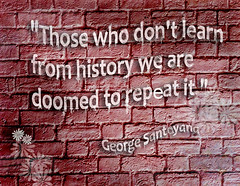Why is it that so many KM implementations never seem to learn the lessons of the past?
 |
| George Santayana quote by Mel_DJ on Flickr |
So why is it a sad fact that so many KM implementations continue to fail?
Here are some potential reasons why this happens
- People who own KM initiatives are human beings, and as prone as other human beings to rush in without "learning before". So they reinvent the wheel yet again. That's why KM is needed in the first place - to influence people to value and to access and ro reuse knowledge, because this is not natural human behaviour; not even for the KM implementors.
- People are prone to the common fallacy that "we are different - the lessons of the past do not apply to us" (the "we are different" fallacy is one of the 5 most common objections that you have to face as a KMer). Sometimes this is expressed as "people these days (Gen Y, Gen Z, whatever) are different - the lessons of the past will not apply to them". Still a fallacy I am afraid, though one that KMers are prone to as much as anyone else.
- KM is simple, but difficult. It is very tempting to go for a mixture of an easy option and wishful thinking, though the easy option will fail. The illusion of knowledge is one that applies to all humans.
- People will offer you miracle solutions - usually technology solutions. "Buy our software, and knowledge will manage itself". In 20 years of knowledge management, technology has never been the solution (though it has always been part of the solution - about 25% of the framework is technology). Believing that it will save you this time, is wishful thinking again.
- There is a lot of pressures from management to do KM on the cheap, quickly. and with minimal disruption. Unfortunately KM requires investment, it requires time, and (being a change process) causes disruption. You can fail quickly cheaply and non-disruptively, but you can't succeed. It's your job, as a KMer, to show management the investment of time and money that will be needed, and the value that KM will deliver in return. Be strong - make your case.
- Maybe you don't know which lessons to trust. There are many dissenting voices in KM, and many people who will tell you many different things. In the past KM has no "authoritative voice". Now at least we have the ISO Standard 30401:2018; the Management System standard for KM, and part of the reason this standard was written was to help people avoid the pitfalls of the past. If you do nothing else in your new KM program, buy the standard and use it as a guide.
KM does work, when the KMers learn and apply the lessons from the past. The successes and the failures of past KM programs have generated a wealth of knowledge about the effective application and implementation of Knowledge Management. This is knowledge of huge value to you.
Use that Knowledge, ladies and gentlemen. Others have striven to generate that knowledge, so that you, if you can avoid the temptations listed above, can guarantee success.




No comments:
Post a Comment